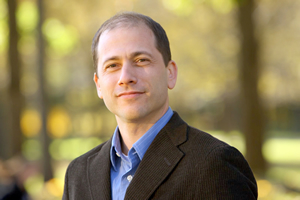Company: Data Appeal
People pay Nadia Amoroso to extract beauty – and meaning – from complex data. The company she co-founded two years ago translates numerical information into three-dimensional shapes, colours and textures. Give her a spreadsheet and she’ll give you back a digital work of art that tells a powerful story.
Dramatic mountains and valleys reflect property values across a city. A riot of angled cones illustrates the visual scope of security cameras. Constellations of green spheres indicate retail store sales in different neighbourhoods. Her images and animations allow clients to interpret complex developed new software tools specifically for datascaping. These applications are now the tools of her trade.
Her company, DataAppeal, offers basic datascaping software for free through its website. Users can pay to unlock more advanced software features, and also to avail themselves of complementary services from DataAppeal staff – everything from primary data collection, through to analysis and advanced datascape design.
As chief creative officer, Amoroso oversees the designs, which are the company’s unique selling point. “We did a crimescape of London and applied a fiery texture to it – using the design to reflect the information. Datascapes are works of art, but they are also instructional. You get a quick reaction to the visual, but then you can dive deeper into the information,” she says. Organizations use her services both to help them understand their own data better, and to communicate that information more effectively to clients, policy-makers and other stakeholders.
Currently, Canada is home to 30 per cent of DataAppeal’s clients, with an equal number in the U.S. Another 20 per cent are European, with the remainder coming from South America, India and elsewhere. Customers range from government agencies to pharmaceutical companies to retail chains. Amoroso teaches part time at U of T, but says she has had little trouble shifting into the entrepreneurial world. “Starting up a business was a bit overwhelming for me in the beginning,” she says. “I had to learn how to provide good customer service. If there’s a problem, clients come to me. Being on the front lines all the time can be a big challenge.”
The company started with three founders two years ago. They now have five employees and planned to hire a sixth in June. Most of the staff work in IT and analytics, with Amoroso herself handling sales, marketing, product development and design.
Though Amoroso thrives as an entrepreneur, she still speaks about success in terms of whom the company might help rather than how profitable it might become. “If we get a lot of users around the world, and if our application is helping them achieve their goals and make better decisions, that itself will satisfy me,” she says.
Q & A with Nadia Amoroso
Last vacation?
We had a workshop recently in Miami. It was nice to go, but it was work-related.
Do you ever unplug?
No.
Ultimate professional goal?
Helping users around the world achieve their goals, make better business decisions and make more money.
Average work week:
60 to 80 hours.
Best business advice I ever received?
Be careful how much information you give away when you talk to bigger companies.
Proudest moment?
When we launched. That was a big thing.
Recent Posts
U of T’s Feminist Sports Club Is Here to Bend the Rules
The group invites non-athletes to try their hand at games like dodgeball and basketball in a fun – and distinctly supportive – atmosphere
From Mental Health Studies to Michelin Guide
U of T Scarborough alum Ambica Jain’s unexpected path to restaurant success
A Blueprint for Global Prosperity
Researchers across U of T are banding together to help the United Nations meet its 17 sustainable development goals






